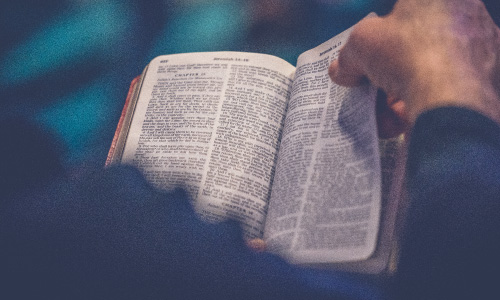Day 33
Posted on: March 21, 2024
by: Gerrit Dawson, Senior Pastor
by: Gerrit Dawson, Senior Pastor
DAY 33 THURSDAY
I Shall Not Die, But Live!
Imagine standing with Jesus, right next to him, in prayer to his Father. Read this passage of praise aloud. As you do so, consider that you are praying along with Jesus, your two voices becoming one as you bless God.
Bless the LORD, O my soul,
and all that is within me,
bless his holy name!
Bless the LORD, O my soul,
and forget not all his benefits,
who forgives all your iniquity
who heals all your diseases,
who redeems your life from the pit,
who crowns you with steadfast love and mercy,
who satisfies you with good
so that your youth is renewed like the eagle’s. (Psalm 103:1-5)
Psalm 118:1, 12-21
Oh give thanks to the LORD, for he is good;
for his steadfast love endures forever!
They surrounded me like bees;
they went out like a fire among thorns;
in the name of the LORD I cut them off!
I was pushed hard, so that I was falling,
but the LORD helped me.
The LORD is my strength and my song;
he has become my salvation.
Glad songs of salvation
are in the tents of the righteous:
“The right hand of the LORD does valiantly,
the right hand of the LORD exalts,
the right hand of the LORD does valiantly!”
I shall not die, but I shall live,
and recount the deeds of the LORD.
The LORD has disciplined me severely,
but he has not given me over to death.
Open to me the gates of righteousness,
that I may enter through them
and give thanks to the LORD.
This is the gate of the LORD;
the righteous shall enter through it.
I thank you that you have answered me
and have become my salvation.
What Is This Psalm About?
On Day 15, we looked at a later part of Psalm 118 and its connection to Palm Sunday. Today we recall that this was the last of the Hallel (praise) psalms prayed at every Passover. When Mark 14:26 tells us “And when they had sung a hymn, they went out to the Mount of Olives,” we can be confident that Jesus and his disciples were singing Psalm 118. Today’s section would have given Jesus words of encouragement just before he entered the agony of Gethsemane. The Psalmist thanks the LORD for a mighty deliverance from near-fatal suffering. His words match the prayer of Jonah 2, “Out of my distress I called on the LORD” (Psalm 118:5, Jonah 2:2), quickly linking us to Jesus and his identification with Jonah (Day 31).
Moreover, rejoicing over an individual deliverance leads to a communal celebration of the LORD’s mighty deeds. The one who was saved from death sees his redemption as the inauguration of a greater work of God for all the people. So he invites the congregation to join him in praise. Hence, we can see the psalm working in the past, future and present. It points backward to the first Exodus and forward to the “exodus” of Jesus from Sheol. It also gives present hope for the LORD’s people for the psalm points to the deliverance from death those united to Christ can expect.
What Might This Psalm Have Meant to Jesus?
Today, let’s lift out one verse, verse 14, and see where else this sentence occurs in Scripture. When we see the connection to the big story of God’s redeeming plan, we’ll gain an understanding of what it means for the risen Jesus to raise this song. Trust me now as I lead you down a windy path to find a lovely treasure.
The Lord is my strength and my song; he has become my salvation.
We’ve noted that our Bibles present the word LORD in all caps to translate the sacred name of God which is YHWH or Yahweh in Hebrew. What’s fascinating is that in this verse, the psalmist has written a shortened version of God’s name: Yah. Of the more than 6800 times God’s name is written in the Old Testament, only 48 times do we get this shortened form, mostly in the Psalms. Why? The one-syllable form of the name may well help in poetic meter. But more, it implies an intimacy that arises from faithful prayer in the same way that shortening the formal name of a loved one evokes a sense of familiarity and personal history, of connection and closeness.
The first use of Yah occurs right after the Exodus, within the Song of Moses, as Yah’s people rejoice that “he has triumphed gloriously; the horse and his rider he has thrown into the sea” (Exodus 15:1). Moses sings, “Yah is my strength and my song, and he has become my salvation; this is my God, and I will praise him, my father’s God, and I will exalt him” (Exodus 15:2). So we realize that Psalm 118:14 has directly quoted Moses’ song including the daringly intimate use of Yah. The psalmist links his personal deliverance to the mighty act on behalf of all the LORD’s people in the Exodus. Little wonder Psalm 118 made a perfect closing psalm for the annual celebration of Passover!
But there’s another significant connection. Isaiah 12 also quotes these same words not, however, in the context of looking back in thanks for a past deliverance, but looking forward in expectation of the future when the LORD would bring back a remnant of his people from exile:
You will say in that day:
“I will give thanks to you, O LORD,
for though you were angry with me,
your anger turned away,
that you might comfort me.
“Behold, God is my salvation;
I will trust and will not be afraid;
for the LORD GOD [Yahweh Yah] is my strength and my song,
and he has become my salvation.” (Isaiah 12:1-2)
Isaiah knew that the intimately close yet all-powerful LORD I AM not only saved in the past. He will redeem his people from desperate trouble in times to come. And a celebration equaling Passover joy will ensue. Whenever Isaiah wrote of the return from exile in Babylon, his words also pointed to a more distant future. For the state of human exile cannot be healed simply by a restoration of political freedom or a geographic homecoming. We need our deep alienation from God to be healed. Our inconsolable longing can only be assuaged when communion is restored. And that requires a great savior who will both suffer and conquer for us.
So now let’s think again about what it means for Jesus to exult on Easter, “I shall not die, but I shall live, and recount the deeds of Yah.” When Jesus affirms that Yah, his Father, is his strength and song, he gathers together the whole story of redemption—past, present and future. This journey of his is the heart of bringing humanity home to dwell in the Father, Son and Spirit. In Yah!
Praying with Jesus
How can it be, that I should call the Almighty
By such tender names?
Yah! My great God who is the song
That sings through all the days of my life.
Yah! The strength that undergirds every trial,
So mighty, yet your touch accounts for my frailty.
Abba! Father!
As you taught me to pray, Lord Jesus.
Your Father and now mine,
Picks me up with ease
And holds me gently
With the strength of mountains.
Yah! You are my strength and song.
You have brought me home from exile,
You have made me human again,
You have returned me to the living
So I may declare to all those powers and people
That sought my downfall,
I shall not die, but live!
And proclaim the mighty deeds of Jesus
Who died and rose and lives
That I might cry with arms lifted up!
Yah! My God!
Posted in:
Lent




 Close
Close











